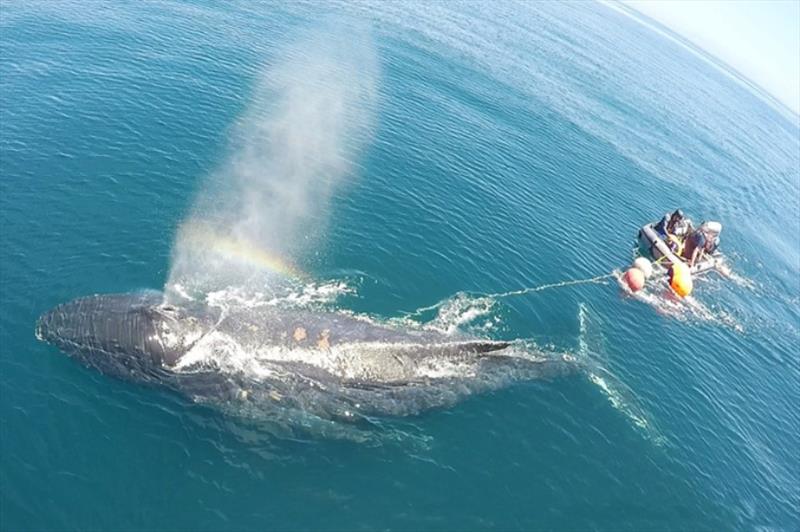
New online training on whale entanglement available for boaters
by NOAA Fisheries 22 Feb 2019 14:19 UTC

Whale Entanglement Team. Photographed under MMHSRP permit #18786 © NOAA Fisheries
Recreational and commercial boaters are often the first to spot and report entangled whales off the West Coast, and The Nature Conservancy and NOAA Fisheries have developed a new online training course to prepare them for such an event.
Although only highly trained and experienced teams should attempt to disentangle whales to minimize the dangers involved to responders and whales, boaters who come across entangled whales can gather information and monitor the animals until trained teams arrive. For example, it helps when they can take and share photographs to help disentanglement teams understand the extent of the entanglement so teams can respond with the right gear.
"Commercial and recreational fishermen are an untapped resource that could fill a much broader and stronger foundation for the entanglement response networks given the right training," said Tom Dempsey, Oceans Program Director at The Nature Conservancy. "It makes sense to develop a training course for them since they want to be part of the solution and they are often on the fishing grounds, or in the places where these events may occur or first be observed."
A record 71 entanglements were reported off the West Coast in 2016. Although that dipped to 31 confirmed whale entanglements in 2017, teams continue to train and prepare to respond to entanglements.
The reasons for the 2016 spike in entanglements is not completely understood. Higher reporting rates due to increased human awareness of the issue and increased activities on the water may be a factor. Another theory is that whales may be chasing prey closer to shore, leading to an increase in the overlap between whales and fishing gear.
Whatever the reason, NOAA Fisheries and The Nature Conservancy recognize the need to prepare recreational and commercial boaters for what to do if they come across an entangled whale. The online training course is an introduction to the entanglement response program and underscores the different levels of expertise required and safety precautions. The module includes information on how to identify whale species, observe their behavior, and assess and document the entanglement through photographs and video.Much more extensive, in-person training is required to qualify for disentanglement teams that are part of the Large Whale Entanglement Response Network overseen by NOAA Fisheries.
"This is the first publically-accessible training to educate ocean users about the information we need to respond quickly and efficiently to whales entangled offshore," said Justin Viezbicke, NOAA Fisheries Stranding and Entanglement Coordinator for California. "Knowing what information and documentation to gather can mean the difference between saving a whale and losing it in the vastness of the ocean."
The Nature Conservancy provided the computer training platform and technical expertise to develop the online course, while NOAA Fisheries provided the content: information, interviews, photographs, and video of previous entanglements.
"This training really supports our overall vision for healthy thriving ecosystems and stable productive fisheries," said Dempsey. "I think it is a model that has potential beyond the West Coast and our intention is to explore doing similar online training in other regions."